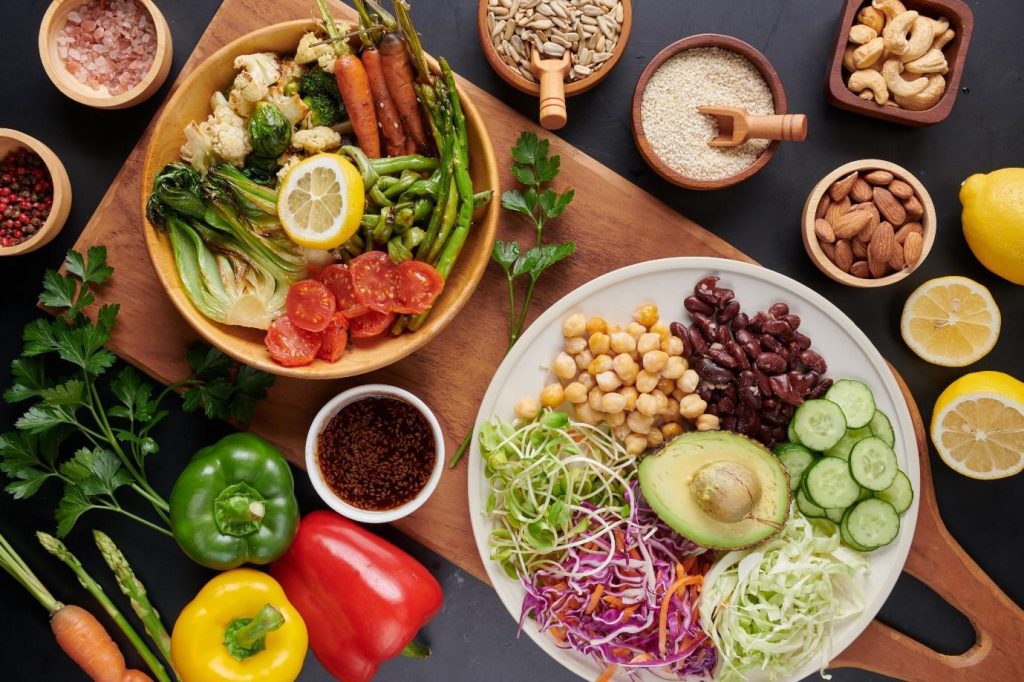The Role of Fibre in Gut Health

Collaborative Post
If you want to improve your gut health, it is best to add fibre-rich foods to your diet. It optimises the function of the friendly gut bacteria, which are essential for your overall health and well-being.
Fibre is a complex carbohydrate that passes through your digestive tract and enters the colon, where it’s fermented by healthful bacteria.
The bacteria break down the fibre and produce by-products, including short-chain fatty acids, which scientists believe are important for a number of health benefits like better immune function and lower inflammation.
Soluble fibre is considered a prebiotic because it feeds the healthy bacteria in your intestines. As the bacteria digest and break down soluble fibre, they release by-products that stimulate the production of mucus to help fortify your gut lining.
These by-products are essential for reducing gut inflammation and helping with a range of symptoms from irritable bowel syndrome to Crohn’s disease to ulcerative colitis.
To learn more about the role of dietary fibre in gut health, continue reading.
What Is Dietary Fibre?
Dietary fibre refers to the indigestible parts of plant foods which our bodies cannot digest or absorb. It plays an essential role in maintaining a healthy diet by helping you feel satiated and controlling your weight.
Fibre comes in two varieties: soluble and insoluble. Soluble fibre dissolves in water to form a gel-like substance that slows digestion, helps control blood sugar spikes, and provides other metabolic health advantages. It can be found in foods like oats, barley, nuts, seeds, beans, legumes, and fruits and vegetables. It may also be taken as a supplement.
Insoluble fibre absorbs water and makes stools that are easier to pass. Not only does it promote good bowel health, but it may reduce the risk of hemorrhoids or colorectal cancer as well.
By increasing your daily fibre intake, you can improve digestion and help prevent constipation, as well as encourage regular bowel movements. Adults are advised to consume at least 25 grams of this important dietary fibre daily.
How does Dietary Fibre help to Improve Your Gut Health?
A healthy digestive tract is essential for weight maintenance, immunity boosts, and even heart disease and cancer prevention. You can support the well-being of your gut by eating foods high in dietary fibre, eg whole grains, vegetables, fruits, legumes, and nuts.
Eating a varied diet that contains both soluble and insoluble fibres is beneficial for the health of your gut microbiome. Dietary fibre, an essential carbohydrate found only in plants, aids digestion by making you feel full for longer, stabilising blood sugar levels, and avoiding overeating.
Foods such as fruits, vegetables, beans, and whole grains contain soluble fibre, which is broken down by beneficial bacteria in your gut to form short-chain fatty acids (SCFAs). These SCFAs have anti-inflammatory effects, help lower blood pressure levels, boost heart health, lower cholesterol levels and protect against certain chronic illnesses.
Soluble fibre also promotes the growth of bifidobacteria or “good” bacteria that improve gut health and immunity. Studies have linked these bacteria to various benefits like balancing pH in your gut, lifting moods and resilience, protecting against inflammation, and increasing insulin sensitivity.
Benefits of a High-Fibre Diet
A high-fibre diet is essential for keeping the digestive system healthy and preventing disease. Here are some benefits of eating a high-fibre diet.
Normalises Bowel Movements
Fibre can help regulate bowel movements, especially for those suffering from diarrhoea or constipation. Soluble fibre can also be beneficial for people suffering from irritable bowel syndrome (IBS). It produces soft and bulky stools that help regulate digestion in your colon.
Helps Maintain Bowel Health
A high-fibre diet can aid in maintaining intestinal health by drawing water into the colon and producing larger, softer stools. These are easier to pass than smaller, hard stools and help promote regularity. It also helps to promote the growth of good bacteria in your gut. Both soluble and insoluble fibre helps to maintain bowel health.
Lowers Cholesterol Levels
A high-fibre diet can help lower cholesterol levels by binding with cholesterol particles in the digestive tract and moving them out of your body before they are absorbed. A diet rich in soluble fibre, such as oats, peas, beans, apples, citrus fruits, carrots, barley, and psyllium husk, can help lower total cholesterol and low-density lipoprotein (LDL) cholesterol.
Helps Control Blood Sugar Levels
Diabetics can benefit from a high-fibre diet, which helps regulate their blood sugar levels and enhances digestion. Eating foods high in fibre helps you feel full faster, helping prevent hunger cravings that might lead to overeating.
Aids In Achieving Healthy Weight
A high-fibre diet can be an effective tool for maintaining a healthy weight. By adding bulk to your meals, fibre helps you feel satiated for longer and consume fewer calories overall.
Best Fibre-Rich Foods to Improve Your Gut Health
Eating plenty of fibre-rich foods is an effective way to promote gut health. They may help combat symptoms associated with digestive issues like constipation, bloating, and gas by providing essential nutrition for the body.
- Berries
- Avocados
- Fibre supplements like ColonBroom
- Lentils
- Chickpeas
- Oatmeal
- Vegetables
Conclusion
Fibre is an integral component of a healthy lifestyle. It may aid with weight loss, digestion, cholesterol control, and blood sugar regulation. Eating a diet rich in dietary fibre has numerous health benefits, such as preventing or relieving constipation and diarrhoea. Furthermore, it may improve your overall gut health. Fibre can be beneficial to your digestive health and overall well-being, yet many Americans, for example, only get half the recommended amount. To maximise the health benefits of fibre, consume a variety of high-fibre foods. These include fruits, vegetables, whole grains, and legumes.
Image www.freepik.com

